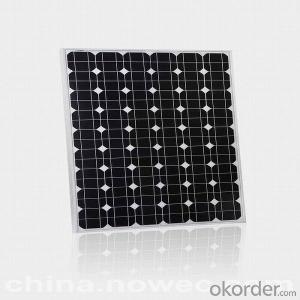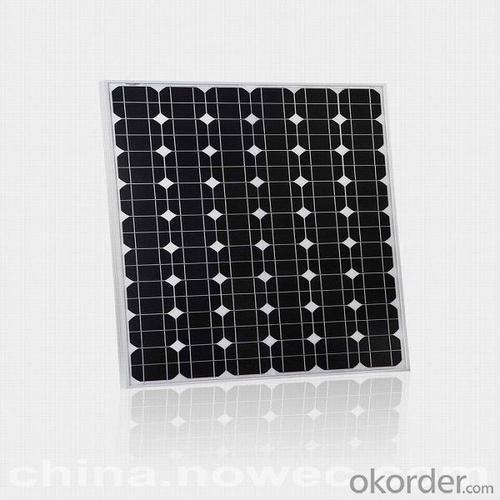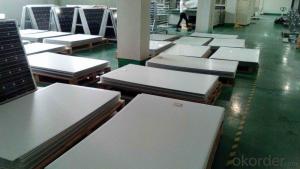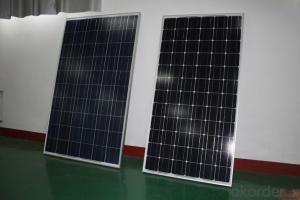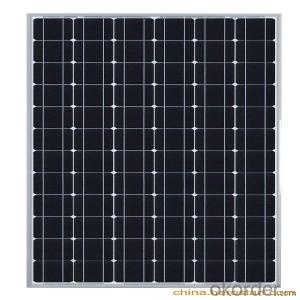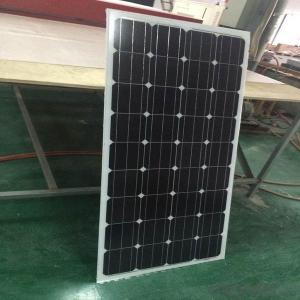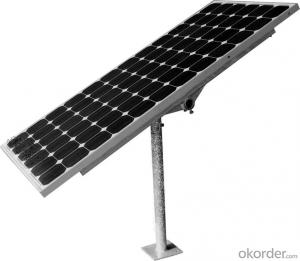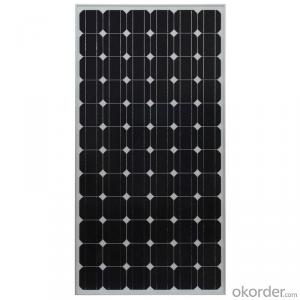375 Watt High Efficiency Mono Solar Panel Made in China for Sale
- Loading Port:
- Shanghai
- Payment Terms:
- TT OR LC
- Min Order Qty:
- 1000 watt
- Supply Capability:
- 1000000 watt/month
OKorder Service Pledge
OKorder Financial Service
You Might Also Like
Specification
Product Description
Product Description
Solar module/panel with high efficiency solar cells
Strong, lightweight aluminum frame design with reinforced sealing and load hold to prevent freezing and warping, and stand against high wind.
Under Standard Test Conditions(STC): Irradiance of 1000W/m2, Am1.5 and 25º C cell temperature.
Mechanical Characteristics
Dimensions: 670mm(L) x 936mm(W) x 30mm(H)
Weight: 9.5kg
Solar Cells: Polycrystalline solar cells, 36 cells
Construction: Front: High-transmission 3.2mm tempered glass; Encapsulate: EVA; Back: TPT
Frame: Clear anodized aluminum alloy Color: Silver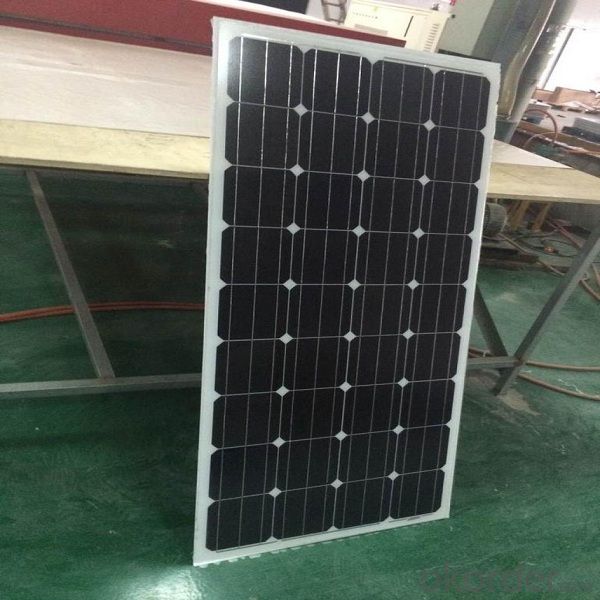 Product features:
Product features:
1. The modules use high-quality imported polycrystalline or monocrystalline solar cells;
Enclosed by high-rigidity tempered glass, with excellent light transmittance and output performance;
2. Surface treated with reflection-reducing process, increasing the light absorption.
Back sealed with anti-aging EVA, resistant from moisture and corrosion.
3. The efficiency of our monocrystalline solar cell is over 17%, and polycrystalline panel is over 16%. We stipulate, the allowance of each panel's rated power has to be positive. Each panel is strictly tested before leaving the factory.
4. Our solar panel is designed with a lifetime of 25 years, and guaranteed that the power decline less than 10% within 10 years, and 20% within 20 years.
| Performance | |
| Rated Power[Pmax] | 100W |
| Power Tolerance | ± 3% |
| Nominal Voltage | 18.25V |
| Design Life | 25 years |
| Electrical Characteristics | |
| Maximum Power [Pmax] | 100W± 3% |
| Maximum Power Voltage [Vmp] | 18.25V± 3% |
| Maximum Power Current [Imp] | 5.56A± 3% |
| Short-Circuit Current [Isc] | 6.34A± 3% |
| Open-Circuit Voltage [Voc] | 21.96V± 3% |
| Current Temperature Coefficient | 0.08%/º C |
| Voltage Temperature Coefficient | - 0.32%/º C |
| Power Temperature Coefficient | -0.38%/º C |
- Q: What in the solar panel wares out so that the panel can not convert the suns energy to electric energy? Please post were you get answers.
- They really don't stop working unless there is some sort of manufacturers deficiency, where a connecting tab(wire) is broken. Generally their output just decreases over the years. There are plenty of solar panels over 40 years old still producing electricity, which is 0 years past the typical 30 year manufacturers waranty.
- Q: How do solar panels affect the property's LEED certification?
- Solar panels can have a positive impact on a property's LEED certification by contributing towards earning points in various categories, such as Energy and Atmosphere, Sustainable Sites, and Innovation in Design. By generating clean and renewable energy, solar panels help reduce the property's carbon footprint, increase energy efficiency, and promote sustainability, thus enhancing the property's overall LEED certification.
- Q: i want to instal solar ligth in my garden
- There are MANY garden lights with built in batteries and solar panels that you just need to stick in the ground. There are also self contained units that are wall mountable. THAT way there is no need to run wiring, use battery stacks, etc. and will also probably be less expensive overall.
- Q: ok so when a solar panel is marked as a certain wattage dose that mean it makes that much in a day in an hour or constant, dose it still work at night or what ? is it worth it or is it more of a pain? can some one tell me what all the watts and volts mean ?? and can some one tell me what a kilowhat is in refrence to some thing i understand like howmany loads of laundey can you do wt a watt? i need help understanding this stuff?
- Caykay, Your question is amazingly great and obscure so that's perplexing to respond to. photograph voltaic panels are designed to value DC batteries, so which you will would desire to alter your electric powered gadget to paintings with DC. So, your quesiton isn't that straightforward to respond to. you will desire to start on your very own examine to get to a useable prognosis / answer. you will desire to renowned what a watt is and an amp is. you will desire to renowned what the cost of a kilowatt is to confirm what proportion watts you utilize in a 300 and sixty 5 days. then you certainly can start to estimate what proportion photograph voltaic panels you want. you do no longer throw away photograph voltaic panels. this is the component of them. as quickly as bought, the capability supplied for years is considered 'loose'. the place you reside has alot to do with it too. Sunny Arizona, or Florida are great and could require fewer panels than different, extra cloudy places. expenditures and structures are complicated, yet obtainable to be researched on the information superhighway. you could touch broking / distributors and that they're going to clarify it ot you. superb to you.
- Q: What is the lifespan of solar panel batteries?
- The lifespan of solar panel batteries can vary depending on various factors such as the type and quality of the battery, usage patterns, and maintenance. On average, solar panel batteries generally last between 5 to 15 years. However, with proper care and regular maintenance, some high-quality batteries can last up to 20 years or more.
- Q: How do solar panels affect the property's overall cost savings?
- Solar panels can have a significant positive impact on a property's overall cost savings. By harnessing sunlight to generate electricity, solar panels can reduce or even eliminate monthly electricity bills. Additionally, excess energy generated by solar panels can be sold back to the grid, providing an additional income stream. Furthermore, solar panels can increase the value of a property, making it more attractive to potential buyers. Overall, solar panels contribute to long-term cost savings by reducing reliance on traditional energy sources and providing a sustainable and cost-effective energy solution.
- Q: Can solar panels be used in areas with high levels of pollution from transportation?
- Yes, solar panels can be used in areas with high levels of pollution from transportation. While pollution may have some impact on the efficiency of solar panels, they can still generate electricity even in polluted environments. However, regular maintenance and cleaning may be required to ensure optimal performance and prevent any potential buildup of pollutants on the panel surface.
- Q: What is the most affordable, yet highest watt solar panels available?
- Those two requests are somewhat at odds with each other. Trina and Suntech make panels that are generally good value. You can search the web and find your best price. If this is for something that does not need to last long, you could get amorphous panels and save some money. But they will degrade quickly in a few months, then slowly over a few years.
- Q: I'm very interested in how solar panels work. I understand the bigger picture of how it can be used for solar heating or as a generator, but I'm lost at the smaller details. Things like: - Could my computer work on solar? It has a 900 watt power supply (this is excluding monitor/speakers) - if a panel is for example, a 60 watt panel, does this mean it will pump 60 watts a second into a battery? - Does solar heating make the water electrified?
- Solar water heating is low technology. There are do it your self plans for it all over the internet. There is no electricity involved. Simply laying a garden hose on the ground in the hot Sun can heat the water to really high temperatures. Just have a shutoff nozzle on the hose, turn on the tap and open the nozzle until water comes out and then close the nozzle at the end of the hose. Let the hose full of water sit in the sun for an hour or so and then open the nozzle and feel how hot the water is that comes out. Be careful, because it can be so hot you can get a burn! When the gallon or so that can fit in the hose has all come out and is replaced by other water from the tap, it will feel cold again. Close the nozzle and wait another hour to heat it up again. A solar hot water heater is just a very long coil of pipe in the Sun, maybe with a pump to slowly circulate water from a holding tank so you can make and store more hot water that fits in the hose. Solar electric power is completely different. It uses semiconductor devices called solar cells to make electricity directly from light. Many of solar cells are usually arranged into large panels to make larger amounts of power. In electricity, Watts = Volts * Amps. Battery capacity is usually measured in Amp-hours. Small solar panels are often designed to produce electricity at 2 volts. A 60 Watt, 2 volt panel makes 5 Amps of electric current, because 2*5=60. So if you use it to charge a 2 volt battery with a capacity of 5 Amp-hours it will take hour to charge. A 0 Amp-hour battery would take 2 hours to charge with the same panel.
- Q: How much would it cost to make an average size house be able to depend on solar panels for all of its power?How many solar panels would you need and wear would you put them? Would the roof be large enough to support the panels needed?Do solar panels work well in higher latitudes like northern USA or southern Canada? Can you power your house for the whole year if you live in these environments? What kind of maintenance do solar panels require?
- I can begin to point you in the right direction. It is a very complicated thing you are asking about. Solar panels produce direct current, in order to store that power for use at night, and on cloudy days, you need a lot of batteries. Those batteries store direct current. In order to use that direct current to power your refrigerator, you need to put it through a thing called an inverter. The inverter produces AC from DC. You may have seen one for sale to plug into the lighter in a car so you can use things that require AC in your car. The inverter looses power doing the conversion. Over time, you can purchase direct current appliances, and make the system more efficient. Years ago, a decision was made to go with AC because of transmission issues (you can move AC across a wire a long distance, and DC is more difficult to move). Many appliances convert AC to DC internally to do their work, but such appliances are expensive. Have I answered your question? Not really. You should understand your question better though.
Send your message to us
375 Watt High Efficiency Mono Solar Panel Made in China for Sale
- Loading Port:
- Shanghai
- Payment Terms:
- TT OR LC
- Min Order Qty:
- 1000 watt
- Supply Capability:
- 1000000 watt/month
OKorder Service Pledge
OKorder Financial Service
Similar products
Hot products
Hot Searches
Related keywords
